Summer 2024 at the North American box office will not scale the $4bn heights of last year. But it will be remembered for achieving a strong recovery after flirting with disaster in the early stages.
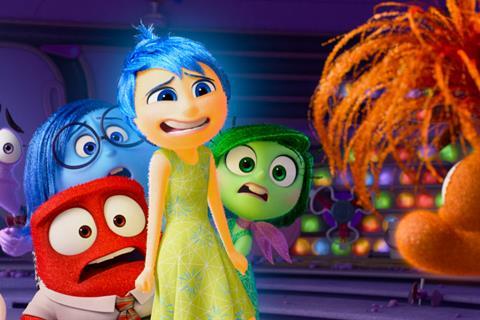
Things did not look good when the year began. A depleted supply line shaped by production delays due to the Hollywood strikes hardly augured well for the months ahead. Marvel Studios tentpoles Captain America: Brave New World and Blade and Paramount’s eighth Mission: Impossible instalment were punted from summer slots into 2025, while Deadpool & Wolverine was pushed back from May 3 into late July. Universal’s The Fall Guy eventually landed that early slot, which Marvel has made its own over the years.
Jump forward to the final weeks of summer and a steady string of hits — driven by Inside Out 2, Deadpool & Wolverine, Despicable Me 4, Twisters, Bad Boys: Ride Or Die and It Ends With Us — have changed the narrative. The season has brought animated bliss courtesy of Joy and Gru, R-rated buddy-movie banter from Marvel Studios and Sony, scares from studios and independents, romantic dramas — and special-edition popcorn buckets promoting the likes of Deadpool & Wolverine.
Hits and misses
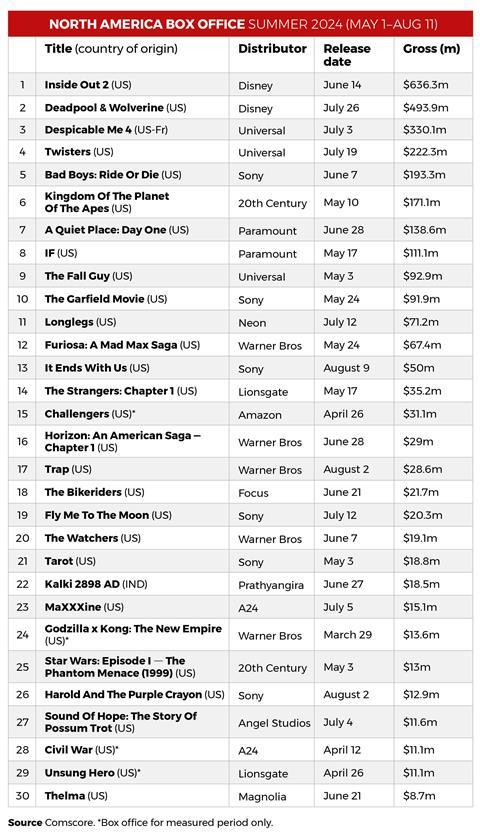
There have been misfires. Kevin Costner’s June release Horizon: An American Saga — Chapter 1 earned $29m, prompting Warner Bros and New Line to abandon the release of Chapter 2 until further notice (the film premieres at Venice Film Festival), while Warner Bros’ Trap from M Night Shyamalan mustered only $30m in the first half of August and Lionsgate’s Borderlands has taken $10m in the same month.
Yet executives are no longer filled with the fears of spring, when doubts were raised there were not enough new films that people wanted to see. March was solid with the $281.9m success of Warner Bros/Legendary’s Dune: Part Two, which opened on an excellent $82.5m on March 3, and the same studios’ Godzilla x Kong: The New Empire, opening to $80m at the end of the month en route to $196.4m.
April and May were dismal, despite a solid $50m total run from Luca Guadagnino’s strike-delayed April opener Challengers starring Zendaya. Box office that month was no match for the same period a year ago, when Universal/Illumination’s The Super Mario Bros. Movie amassed $490.9m in April alone, compared to $438m from all films in April 2024.
The Fall Guy, featuring Barbie star Ryan Gosling and Emily Blunt, landed with a whimper in its May 3 release with a $27.7m opening weekend, 77% behind the $118.4m launch by Marvel Studios’ Guardians Of The Galaxy Vol. 3 a year prior. One week later, 20th Century Studios’ Kingdom Of The Planet Of The Apes swung into action on a notable $58.4m and became the top May release, earning $133.6m of its $171.1m gross that month. Warner Bros’ Furiosa: A Mad Max Saga, although admired at Cannes, did not translate with paying audiences and debuted over Memorial Day weekend on $32.3m over four days. That was 73% less than the $118.8m earned by The Little Mermaid a year earlier, and produced the lowest number-one opening weekend over that holiday in 29 years.
By the end of May, box office for the year to date was trailing 23.3% year-on-year. Then the heavyweights arrived. “Summer started in June,” says Paul Dergarabedian, senior media analyst at Comscore. “After a weak April and May, you began to see a variety of films perform.” Crucially, audiences were watching trailers in cinemas, enticing them back for more. “Momentum, cadence, frequency are vital,” he notes.
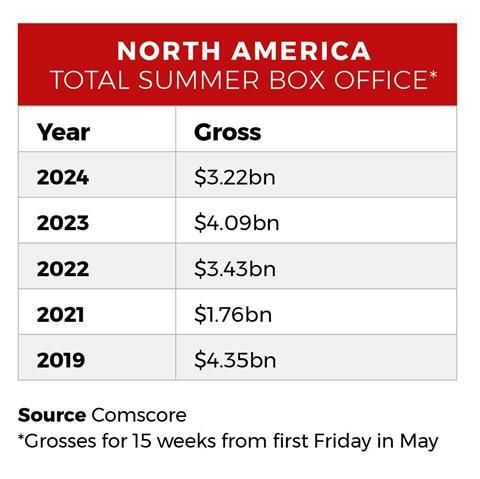
Sony’s Bad Boys: Ride Or Die opened with $56.5m on June 7. It was the first major theatrical release for Will Smith since he slapped Chris Rock at the Oscars in 2022 and audiences appeared to have moved on from the incident. The fourth entry in Sony’s 29-year action comedy franchise reached $193.3m and pushed the series over the $1bn mark at the global box office. By mid-June, Paramount’s family film IF from John Krasinski, a $33.7m May opener, crossed $100m.
Next up was Pixar’s Inside Out 2. It was something of a litmus test: had Elemental the year before done enough to show audiences that Pixar tentpoles merited exclusive theatrical releases, rather than go straight to Disney+ as they had done during the pandemic? Without a doubt. The sequel opened to $154.2m and, currently on $637.9m, will finish summer as the number-one film. It is the highest-grossing animation of all time, in addition to being the biggest film in the world this year on $1.6bn and counting.
The summer has seen independent films hold their own. Magnolia Pictures released Sundance hit Thelma on June 21, starring June Squibb as a nonagenarian not to be messed with. It played in up to 1,290 theatres as the company pushes into wider releases and has grossed $8.7m, setting it up for a solid ancillary run. Osgood Perkins’ independent horror film Longlegs, starring Maika Monroe and Nicolas Cage, delivered the biggest opening weekend for Neon on $22.4m on July 26; it became the company’s biggest domestic hit on $72m and just crossed $100m worldwide.
On a roll
Paramount’s horror A Quiet Place: Day One came along on June 28 with a franchise-best $52.2m debut en route to $138.7m at time of writing. Now, summer was starting to roll.
Universal/Illumination’s Despicable Me 4 ushered in July with style, opening to $75m and going on to reach $332m. A little over two weeks later on July 19, Twisters, Lee Isaac Chung’s homage to Jan de Bont’s 1986 disaster movie Twister, tore up the competition in a sensational $81.3m gust. The season was now firmly in ‘Barbenheimer’ territory and year-on-year the July 19-21 weekend fell 52%, not nearly as catastrophic as box-office watchers had predicted. At time of writing, Twisters, starring Glen Powell and Daisy Edgar-Jones, stood at $225.9m.

The stage was set for the final tentpole of the month. Marvel Studios had not enjoyed a good 2023 by its lofty standards and plenty was riding on Deadpool & Wolverine. Raising the stakes even higher was the fact this was the hit factory’s first R-rated release.
But the film galvanised audiences, opening on an extraordinary $211m — the highest opening weekend of the summer. It has crossed $500m to rank as the second-highest film of the year behind Disney stablemate Inside Out 2, and has earned more than $1bn worldwide, becoming the top R-rated release at the North American, international and global box office.
Disney is the only studio this year with back-to-back global billion-dollar hits, and recently became the first of the year whose films have crossed a combined $3bn globally. “We knew we had a strong slate coming in,” says Tony Chambers, EVP and head of theatrical distribution at The Walt Disney Studios. “Kingdom Of The Planet Of The Apes delivered the biggest movie in May, Inside Out 2 delivered the biggest movie in June, Deadpool & Wolverine was the biggest movie in July, and it’s looking like we’ll deliver another strong number for Alien: Romulus [on August 16].”
Fede Alvarez’s sci-fi horror opened top over the August 16-18 weekend, on an estimated $41.5m. At time of writing, Disney releases accounted for 42% of the summer box office.
Chambers stressed the importance of appealing to as broad an audience as possible, noting: “In order to over-deliver, especially from a domestic point of view nowadays, you need to get the multicultural audience.”
August has already got off to a flying start with strong holdover business from Deadpool & Wolverine, and the stunning $50m number-one launch of Sony’s romance It Ends With Us, starring Ryan Reynolds’ wife Blake Lively. (By August 22 that film has crossed $100m in North America and $200m worldwide.) At time of writing, year-on-year box office had clawed back from end of May’s 23.3% deficit to trail by 15.9%. Industry insiders say the summer season could finish as high as $3.6bn. Looking ahead, some are forecasting an annual haul between $8bn and $8.5bn, a way behind 2023’s $9.1bn but not catastrophically so.

For Neon’s chief distribution officer Elissa Federoff, Longlegs was just one element in a summer where “everyone has won — the big studios, the specialty companies, the audiences”, and delivered filmgoers what they do not always get. “When Challengers came out, it brought out an underserved Gen Z audience,” notes Federoff. “Bad Boys: Ride Or Die was driven primarily by a Black audience. Longlegs, I would argue, catered to an underserved R-rated horror audience.
“Thelma was a great example of an outlier arthouse film for an older audience that was an event picture,” she continues. “Twisters was an all-American popcorn movie. Deadpool, & Wolverine catered to an underserved [R-rated] Marvel audience. It Ends With Us was the event movie for women.”
Looking ahead to the rest of the year and into 2025, executives say they are encouraged by the volume and range of films. “We’re in better shape in terms of product flow than we were 18 months, two years ago, when there was just one tentpole movie every three months that people could galvanise around,” says Walt Disney’s Chambers. “Now it’s one every three or four weeks.”
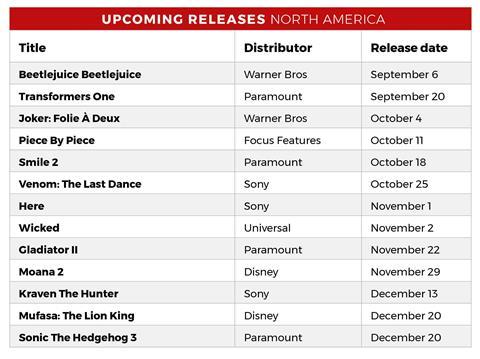














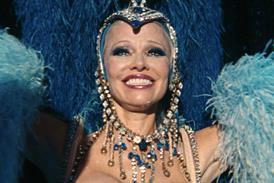










No comments yet